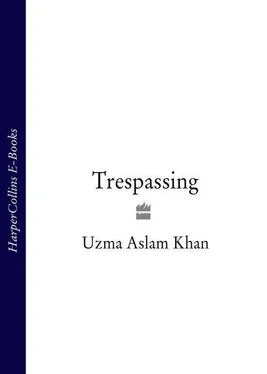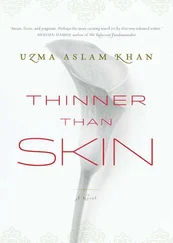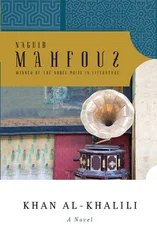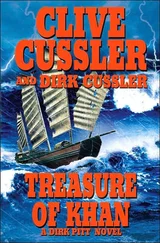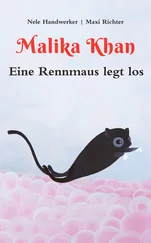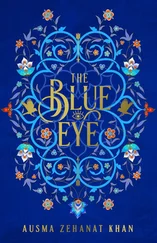She’d left something for Daanish to find too. But he’d said nothing about the picture in the lacquer box. For twenty-three years that face had followed her: wind-blown curls framing a smooth high forehead, nose a touch pink, lips parted in a jubilant smile. Shoulders pressing into his. His scarf grazing her cheek. Both laughing as though unable to believe they could be so happy.
She’d wanted Daanish to know how the image taunted her. But he’d said nothing.
The clouds sailed sluggishly by, occasionally yawning, letting her peer inside a charcoal gray window. Sometimes the picture on the other side was blue. At others, impenetrably black. Then the window swallowed itself and opened somewhere else.
Would God forgive her wrath? She wanted only to be sure of one thing, and that was her son. The doctor had stripped her clean of all pleasures but that one. He’d never touch it, though even in death, he kept trying. That’s why he’d left the gift with Daanish. If she could find and destroy it, at last, Daanish would be hers alone.
She sighed: she’d over-pruned the bush.
It was just after one o’clock. He’d left three hours ago. If he’d let her accompany him, she could be sitting with him on the shoulder-boulder, and together they’d look out at the roiling sea, under the roiling clouds, and perhaps the first monsoon of the season would fall on them. The thick plump drops would strike their teacups and they’d sip the rainy brew down, watching the drops bounce in the same way over the vast sea. She’d wear her blue shawl, and they could hunker beneath it.
Anu clipped her way over to the plumbago bush, the fantasy so vivid she could smell the rain. It occurred to her that since she knew where her son went every few days, she could follow him. She could ask her brother to take her, or perhaps one of the neighbors. The boy had always liked the doctor’s surprises; why wouldn’t he like hers?
The top of her head was like a hot plate. She’d been outside far too long. Her fair skin would burn. Gathering the trimmed branches and mound of fallen leaves into a plastic bag, she opened the front gate. She was about to drop the bag in the basket by the mailbox when she paused: it was Monday, the load would not be picked up till Friday. She decided to walk to the empty lot at the end of the street, where everyone left their trash.
Plastic bags flapped in the branches of the tree sprouting in the center of the dump. Beneath it was a pit stuffed with rotten food, plastic containers and ash from numerous trash-fires. Waving the flies away, she tossed her bag inside, disturbing the fiery red ants crawling in feces. This was where she’d thrown Daanish’s photographs the day of his arrival, and before that, while the doctor lay dying, where she’d dropped many of his smaller things. Like his shells.
It hadn’t been easy but she was glad she’d done it. The doctor had sent him to Amreeka but Daanish didn’t need those pictures. The doctor had chosen the colors of Daanish’s room but then he’d died. Wouldn’t the poor boy miss him more if she hadn’t repainted it? Ditto with the shells. The doctor had given them but Daanish wouldn’t want them any more. By throwing the doctor’s things away, she was only helping ease Daanish’s pain.
Anu turned back. Passing Khurram’s house on her right, she squinted up at the enormous concoction of green marble columns, pink tile and brass fixtures. Voices approached. The gate opened. A car reversed onto the road. She moved aside, glancing within. It was the doctor, off to attend a meeting in a dark gray suit and striped tie. He threw her an admonishing look: Go back to your silly household things.
Blinking, she saw it was in fact Khurram, talking into a cell phone.
Spotting her, Khurram gaped with as much astonishment as she did. She read him thus: realizing he was supposed to be with her son, he ducked to escape her attention, felt foolish for already being noticed, sat up again, hesitated, and as the car drove away, decided to wave.
As humidity levels rose, Dia suffered intense mood swings. The only place to be was the cove, with Daanish, despite Salaamat’s still, ominous presence. So why wasn’t she always there?
Her time was spent listening for the phone to ring (how could she ever have cursed man’s greatest invention?), and when it did, she rushed to answer the gnawing bell that now was dulcet melody. If it was him, she practically pirouetted.
If not, sometimes she called, at others she told herself it was his turn. Then she gazed from the phone to the gray sky, and then to the calendar hanging on the kitchen door. June slipped into July and July into its third week, but this barely registered. Nor did Inam Gul, who trailed her open-mouthed. All that mattered was her next meeting with Daanish.
But within moments, she chided herself for wasting her days in this disgusting expectant haze. How girlish. How typical.
Next she’d worry. On average, he called twice daily. Did this mean he wasn’t thinking of her in between?
And finally, her heart raced as she repeated every word Daanish had last spoken, beginning with his passionate insistence through the tiny holes in the plastic headset: ‘I must see you. Not tomorrow. Today. Now.’ The memory so excited her she’d freeze, oblivious to where she sat or stood, ate or read, said or had been thinking of doing. It was more essential that she imagine where he stood or sat, what he ate or read, said or had been thinking of doing. She saw the muscle on the inside of his thigh, just above the knee — had it clenched when he leaned to speak into the phone? And the long scratchy neck, the hairless spot on each forearm — when could she circle them again with her nose? Until then, the hours were on hold.
The long drive to the farm was just what was needed: an ideal pretense for nonstop dreaming. She filled the thirsty plains outside her car window with her longings, barely even noticing the guards flanking her. Whether they ogled or shifted too close, she was with Daanish, lolling in the sand between massive boulders, relishing his fresh scent. Listening to the waves crash into their fort of rocks, foam occasionally spilling over, onto their nest. Wiping the salt from his eyes, while he promised, ‘When I’m here next, in the winter holidays, the sea will be perfect for teaching you to swim.’ He refused to accept her fear of water. She refused to accept that in less than a month his college would reopen and he’d be gone. While the car raced through the scorched riverbed, she floated with him, limbs entwined, and always would.
At the farm, yet another cycle had begun. The breeder moths’ seed was scrupulously analyzed for disease and the stainless eggs kept in incubation for ten days. The first to be stored had already hatched into tiny, baby caterpillars that wanted nothing but to eat.
Their greed was like hers.
Today, Dia stood before the trays that held the half-inch-long, newborn larvae. Her thoughts drifted from Daanish to the exam results printed in the paper that morning. She’d failed the retake, obviously. It meant she’d have to repeat the class. All those who’d cheated had passed.
Angrily, she shook the leaves in a tray. The larvae twitched, then champed again. The ones dropped down Nini’s shirt had been several days older. She missed her friend. Never again would she love another woman with such ease. Their trust, impervious for nine years, was gone for ever. It had splintered; she was left examining the sores. Possibly, Nini did the same. Dia considered it her second-greatest loss, after her father. Only this time, contrary to what Daanish insisted, she was responsible.
Читать дальше
Конец ознакомительного отрывка
Купить книгу
